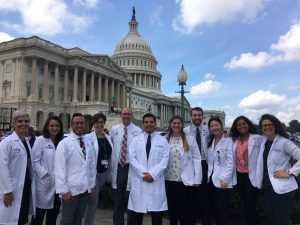
The Class of 2020’s Avanthi Jayaweera, second from right, and other AMSA members meet California congressman and physician Raul Ruis (center) in Washington, D.C. Jayaweera is AMSA’s 2018-19 Education and Advocacy Fellow.
Academic medicine can sometimes seem like an ivory tower: a sterilized, well-lit operating room, high above the dirt and chaos of the world below, to which students climb, step by step, until they arrive at the final height and are called “Doctor.”
But to the Class of 2020’s Avanthi Jayaweera, not only is the path to the coveted M.D. less linear, but the ivory tower itself is an illusion. Where medicine belongs, the enterprising student advocate believes, is down in the streets, not hovering above them.
“My medical training can only take me so far,” Jayaweera says. “If we want to strive for sustainable solutions for the community, we need to challenge ourselves to look at our system as a whole and analyze the intersection of policy and health.”
For one year, Jayaweera will explore those intersections thanks to her American Medical Student Association Education and Advocacy Fellowship.
Awarded annually to a single U.S. medical student, the AMSA Education and Advocacy Fellowship offers recipients a chance to help shape educational and advocacy programming while delving into issues ranging from health care access to global health equity, diversity and social justice.
Accepting the fellowship meant deferring graduation for one year, a choice that can feel risky for students already committed to at least seven years of medical school and training.
“I was nervous about possibly being away from clinical medicine for a year,” Jayaweera says. “But I just knew this was a once-in-a-lifetime opportunity to have this much time to study these policies.”
Support she received from the Harry and Zackia Shaia Scholarship, awarded to students who demonstrate a commitment to community service, helped ease her decision. The scholarship has covered a portion of her tuition and fees for the past three years.
“To know I had that type of support and financial aid was a tremendous help,” she says.
As part of her fellowship, Jayaweera spends time in AMSA’s Northern Virginia headquarters and travels around the nation to work with local AMSA chapters. She also completed a six-week clinical rotation with Kaiser Permanente Northern California Residency Programs focused on community-based issues — in Jayaweera’s case, working with Spanish-speaking patients as well as transgender and non-binary communities.
As the Education and Advocacy Fellow, Jayaweera oversees AMSA campaigns including but not limited to Med Out the Vote, a program that encourages health care providers to vote, and Just Medicine, an initiative that seeks to diminish the influence of corporations in medicine and increase transparency in order to make access to health care more equitable and fact-based.
The latter issue in particular has been close to Jayaweera’s heart since volunteering at a free clinic near Virginia Tech, her undergraduate alma mater, and encountering a host of patients who couldn’t afford medication.
“It’s frustrating when the problem isn’t that we don’t have a cure. The problem is that we have a cure, but it’s too expensive,” she said. “It’s almost the same problem: patients still don’t have access to it. We can’t have affordable health care without affordable meds.”
Many of Jayaweera’s efforts as a fellow have focused on coming up with more effective strategies to get medical students involved with health care policy and training them to be good advocates within the profession.
That task has involved everything from offering local AMSA chapters seminars on prescription drug costs and other issues to teaching them how to set up advocacy days and meet with elected officials. Jayaweera also organized the Advocacy Leadership Summit at VCU this past November and will plan AMSA Advocacy Day in March 2019.
“I’m trying to find different ways to empower students to talk about these issues with confidence and expertise,” Jayaweera says.
Involved in AMSA since premed, Jayaweera has from the start been acutely sensitive to the intersections between medicine and the political and social factors that impact individuals’ health.
“Even as a physician, there are lots of factors outside of our clinical scope that affect health,” she says. Access to grocery stores with healthy food, living in a safe neighborhood where people can go outside to exercise, and affordable drug prices are only a few of the most obvious, she says, “and those are things that I can’t personally control in the clinic.”
It is for that reason that in looking at her own mission, Jayaweera sees more than each individual patient.
“I view the community as my patient,” says Jayaweera, who is active with the medical school’s International/Inner City/Rural Preceptorship program.
Mark Ryan, M’00, H’03, now an associate professor with the School of Medicine, serves as one of Jayaweera’s mentors, both in his capacity as the director of the I2CRP program and as adviser to the school’s AMSA chapter. He sees her fellowship as a logical extension of a path she has walked since arriving at VCU.
“The thing that strikes me most powerfully is her genuine desire to use her training and her skills as a health professional to help communities and individuals strive for the best possible health that’s available to them,” he says. “It’s been this common theme of seeing the role of a physician, the role of a medical professional, as being more than a prescription.”
For Jayaweera, perhaps the best gift to patients beyond prescriptions is policy.
“If I don’t speak up on these issues, who will?” she asks. “As physicians and future physicians, we are in a position where we’re natural leaders. This is not being political. This is standing up for our communities and our neighbors and the people we live with on a day-to-day basis.”
By Sarah Vogelsong